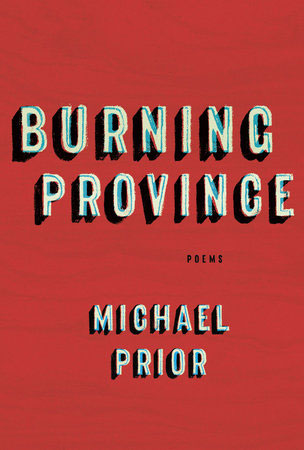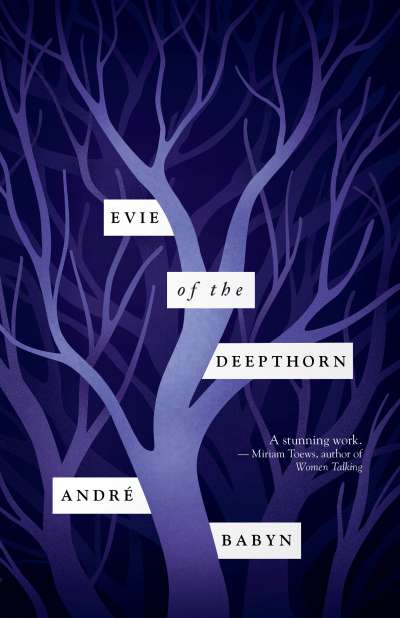Publishing a book is a significant milestone for any writer — and for two graduates of the Master of Arts in English in the Field of Creative Writing program at the Faculty of Arts & Science, that goal recently became a reality.
Michael Prior, who graduated from U of T in 2015, is a writer and assistant professor of English at Macalester College. His poems have appeared in numerous magazines and anthologies, including Narrative Magazine and the Global Poetry Anthology 2015, and he is a past winner of the Magma Poetry Editors' Prize, The Walrus Poetry Prize and Matrix Magazine's Lit POP Award for Poetry. Burning Province, published in March 2020, is Prior’s second collection of poems. His first, Model Disciple, was published in 2016 and was named one of the best books of the year by the Canadian Broadcasting Corporation.
What inspired you to write Burning Province?
 My maternal grandparents and their families were forced into an internment camp during the Second World War. They were stripped of their property and possessions and sent to the interior of British Columbia, where they lived in tar paper shacks. I wanted the book to explore questions of intergenerational memory and cultural trauma — the ways in which such an experience, its narratives, are inextricable from my sense of family and my own mixed-race identity.
My maternal grandparents and their families were forced into an internment camp during the Second World War. They were stripped of their property and possessions and sent to the interior of British Columbia, where they lived in tar paper shacks. I wanted the book to explore questions of intergenerational memory and cultural trauma — the ways in which such an experience, its narratives, are inextricable from my sense of family and my own mixed-race identity.
Burning Province is also an elegy for the last generation of Nikkei — members of the Japanese diaspora — who were interned: as they pass away, the camps begin to exist only in spaces of communal memory and imagination, of historical record and artistic re-witnessing. My grandmother, who raised me when I was young, fell ill and passed when I was writing the first poems that would become part of the book. As she was dying, forest fires raged throughout British Columbia. I could see clouds of smoke billowing out to sea from my grandmother's room at Vancouver General Hospital. It felt oneiric, like the whole world was mourning her. It set the palette for the book.
Did the experience of writing Burning Province differ from that of writing Model Disciple?
Model Disciple was a collection of what my editor and I thought were the best pieces I had written during a certain period; its themes and motifs were those that coalesced through the fact that the poems came from one perspective — my own.
Burning Province is more interested in creating a sustained, immersive grammar of images, linguistic textures and forms that teach you how to read the book, while also complicating themselves as the collection progresses. Burning Province was a much tougher book to write than Model Disciple, but I suppose that was a necessary difficulty, a hopefully meaningful one.
What drew you to the creative writing master’s program at U of T?
I was drawn to the program by the director, Rick Greene — he was the one who called me. I applied to the program on a whim, not knowing what I wanted to do after undergrad, but feeling that I wanted more time to read and to write with expert guidance. I looked at several programs, but the structure of U of T's program, the faculty list, the funding and the location all were incentives. I am very grateful to have gone. I had wonderful professors and a great cohort.
When did you first become interested in poetry?
I've always loved poetry, though I didn't start writing it until late in my undergrad through the encouragement of a couple of kind professors. I became fascinated by the way one can follow language into moments of discovery. If language is in some ways the salient medium through which we move and live, then remaking it, breaking, it, giving it our intense attention, seems an essential task.
What advice would you give to aspiring poets?
I would pass along what a fantastic poet and dear friend once told me: as poets we should read widely of our contemporaries while having our most sustained conversations with the dead.
Self-Portrait as a Portrait of my Grandfather, December 8, 1941
If a memory bears radiation’s
relationship to time; if his eyes are
and are not mine; if strawberries once
rotted in muddy crates on a farm
unfarmed and seized. Then, a reborn face’s
parabolic features curve an axis
never crossed; then, salt and silver nitrate
scribe light’s dictation on the page
of them and us—of me and him—of fear’s vindictive
aperture and frame. Of how what’s outside
fades what’s within—or how a cold sun gathers in my eyes,
my hair, my mind, like half-lives
borne on wind. How half alive and half asleep,
each waxen pore’s single seed.
Excerpted from Burning Province by Michael Prior. Published by McClelland & Stewart, 2020. All rights reserved.
André Babyn
As a member of University College, André Babyn graduated from U of T with an honours bachelor of arts in 2012 before earning his master’s in 2016. Today, he is a writer, editor and PhD student in the Department of English. His fiction has been published in magazines such as Maisonneuve and Grain, and he has won several awards, including the Norma Epstein Award for Creative Writing (Short Fiction) and the Adam Penn Gilders Scholarship in Creative Writing. Evie of the Deepthorn, published in February 2020, is his debut novel.
What inspired you to write Evie of the Deepthorn?
 I’d briefly moved back to my hometown of Caledon, and I felt almost shocked at the experience after only six years of living in Toronto. It was very different living there in my mid-twenties — in a lot of ways it felt almost hostile to the person I had become. And that felt strange because it seemed so counter to the ways Canadians often represent small towns in popular media.
I’d briefly moved back to my hometown of Caledon, and I felt almost shocked at the experience after only six years of living in Toronto. It was very different living there in my mid-twenties — in a lot of ways it felt almost hostile to the person I had become. And that felt strange because it seemed so counter to the ways Canadians often represent small towns in popular media.
It gave me the idea to write a novel which interrogated the little lies we tell about the Canadian experience, and particularly those focused around the idea of the small town. But I wanted to write about growing up, too — growing up in a world that had always felt so far away when I was younger, though it wasn’t, really. And about the confusion of learning to look outside yourself, as well as to understand that, to a certain extent, we’re all “locked” into our private experience of the world.
What drew you to U of T?
At the time I started my master’s, what really interested me was the thesis year that the creative writing program offers. I am really grateful that I was able to work with Miriam Toews as my mentor during that year. What was crucial, though, and what I hadn’t anticipated, was entering into the company of the six other writers in the program, who all became friends. I couldn’t imagine being part of a more inclusive and stimulating community, and it’s one that extends to alumni as well. There’s a fraternity of poets and writers meeting up at readings and launches and in writing groups throughout the city, welcoming each new generation as they poke their heads out of the Jackman Humanities Building.
What do you hope to do after your PhD?
I definitely see myself writing more novels. Following my PhD, I’d like to teach, preferably as a member of a creative writing faculty in an English department somewhere, but the field is changing so quickly, and I’m open to alternative ways of making use of my degree.
When did you first become interested in writing?
I think to a certain extent it was something I always wanted to do, and indulged intermittently, in fits and starts — often taking the form of sprawling fantasy novels that never made it beyond 15 pages. It wasn’t until my last semester of high school and my first year at U of T that I found the space and time to really focus on becoming a writer, reading and acquiring books that seemed canonical and spending hours every day writing in the New College library.
What advice would you give to aspiring writers?
Read widely, and deeply, and indolently, and against the grain, and with it. And make a daily practice of writing. And throw away your phone. (I need to follow through with that last piece of advice.)
Excerpt from Evie of the Deepthorn
Sometimes I thought about Mom and me, about how we were all that we had left. And how I felt guilty about that without really knowing why. And also that I was afraid, somehow, that whatever it was that Jeff had felt, I would feel it too. Like it was contagious. And then I thought back to the beginning of Evie, Evie entering the Deepthorn, lost, alone. Only it wasn’t Evie disappearing into the trees, it was Jeff. And that gave me a glimmer of hope. Like he could come back.
I wanted him to come back.
But I was worried that if I went after him, I’d get lost, too.
Excerpt from Evie of the Deepthorn by André Babyn © 2020. All rights reserved. Published by Dundurn Press Limited.

